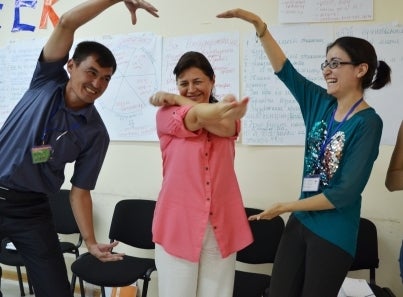Youth leaders and the national specialists working with young people were trained as master trainers to deliver peer education training programmes in the area of adolescent reproductive health and healthy lifestyle across country.
The seminar was aimed at promoting the principles of youth engagement and participation in work of the national specialists with the young people, including the methodology of peer-to-peer education, as an approach that has proven its effectiveness in promoting healthy lifestyle and adolescent reproductive health. The seminar also served as a platform to reinforce the image of Y-PEER international network, which works in more than 44 countries, including Turkmenistan, to provide opportunities for young people to make responsible decision affecting their health.
During the training for trainers, Ms. Nikitina carried out series of sessions to increase the knowledge and training skills necessary to promote an integrated model of peer-to-peer programs. Among them were sessions on the “Art of Being a Trainer”, interactive ways of working with groups, different techniques for conveying factual information, various methods of work with the group to enable the development and reveal of their attitudes and beliefs, and behavior change theory.
Several national professionals working with young people were also invited to conduct a session for the participants, including TEEN Hotline gynecologist Maya Amanovna Akhmedova, who shared the most up-to-date and reliable information on adolescent reproductive health and demonstrated her experience on building a trusting relationship with the young people when providing quality youth-friendly services.
UNFPA recognizes peer to peer education as one of the key technical methodologies for preventing social problems among young people. It is based on the premise that the youth are more inclined to discuss adolescent reproductive health issues with their peers than with parents or other adults. Formalizing and focusing these conversations on safer behavior can empower youths to protect themselves.
***
UNFPA: Delivering a world where every pregnancy is wanted, every childbirth is safe, and every young person’s potential is fulfilled.
For additional information, please contact
Yelena Butova, Education Advisor
Ene Tuyliyeva, Advocacy Communication Associate
Tel: 425250; web: unfpa.org.tm


